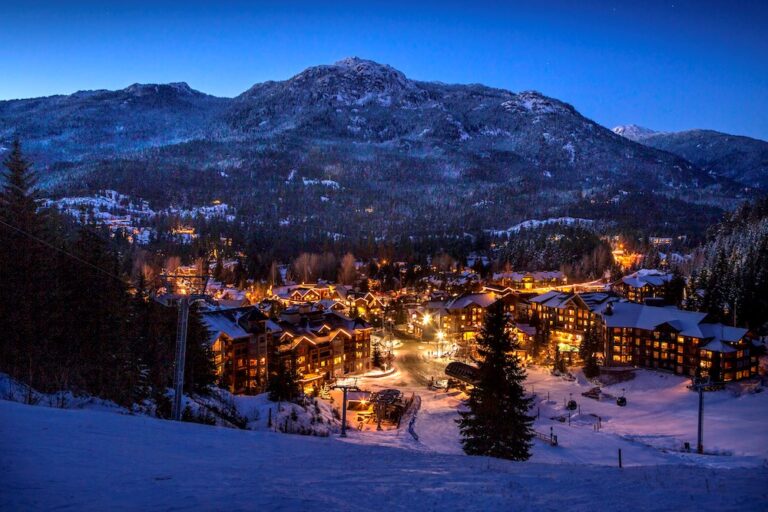Whistler’s mayor and city council heard an update this week on the city’s long-in-the-making Smart Tourism Strategy, which is highlighted as a priority area in the city’s 2023-2026 strategic plan, along with housing, climate action and community engagement.
During an update at the Municipal Resort of Whistler (RMOW) regular council meeting on June 11, RMOW Economic Development Officer Richard Kemble reported on how the municipality has sought to understand smart tourism through community engagement and studying other community approaches.
“One of the key lessons that emerged is that success can only be achieved through partnership building and meaningful collaboration,” Kemble wrote in his report to the city council.
Kemble described the current state of RMOW, citing communities such as Lake Tahoe, California; Queenstown, New Zealand; and Amsterdam, Netherlands, as examples of communities studying smart tourism. RMOW has a Smart Tourism Committee (STC) made up of 16 voting members drawn from council, municipal officials, local businesses, cultural organizations, and the community at large.
The report said STC recently completed a consultant-led “vision-building journey” workshop that will guide Whistler’s “collaborative approach to tourism destination management and stewardship.”
A draft “vision” developed during the workshop will be refined with community input and will be made public this summer to “ensure unity and excitement behind a shared vision of what can be done.” Central themes emerging through the vision are exploring how to balance visitors and residents, community collaboration, and being courageous in decision-making.
In his report, Kemble said smart tourism requires support from local communities and businesses.
“We will work to gather feedback from all stakeholders to foster a sense of ownership and pride in the vision for Whistler’s future tourism industry,” the statement reads.
One example of community management is Venice, which Kemble described as “bold” for piloting a day trip tax, requiring non-overnight visitors to register and pay €5 per day to visit the city.
“This is an example of a difficult policy decision trying to strike a balance amid growing tourism and visitor pressures,” he said. “The tax is designed to act as a deterrent to tourists while also generating revenue that can be reinvested to help manage visitor numbers.”
Results from this pilot project are still being studied by observers, including in Venice and Whistler.
” [smart tourism] “As this effort continues to evolve, learnings from bustling tourist destinations like Venice will be reviewed to accelerate Whistler’s learning process,” Kemble wrote.
“In this way, we can adopt or explore methods that have worked and avoid those that have not.”
Kemble concluded his report by warning that if Whistler does not update its management practices to accommodate the continued expected growth in visitors, it “risks a decline in the tourism industry and resident experience that has been carefully nurtured over a long period of time.”
“We already feel the pressures during peak hours – getting stuck in traffic, waiting for hours in lift queues or not being able to find somewhere to sit in the park – and if these peak days become more frequent, the problem will only get worse.”
Reporting to council, Mr Kemble said the focus of the smart tourism concept and work being done with partners at RMOW level was to capitalise on the strengths of the region whilst limiting the weaknesses that come with popularity.
“The real question is how to increase Whistler’s ability to welcome visitors while still maintaining the magic that makes it so special,” Kemble said.
“We really need to think about what Whistler is and what makes us happy being here,” he added, citing the environment and community as some of the reasons for this.
Community engagement on the “vision” developed by the Smart Tourism Committee will take place in late 2024, with a destination management plan as the ultimate goal in the future.
During the question and answer session and written comments, all Councillors who spoke on the matter expressed their support for the concept of Smart Tourism and endorsed the efforts made by RMOW to get ahead of the challenges of the province’s growing population and increasing numbers of visitors to Canada so that communities can benefit from tourism.
Councillor Cathy Jewett highlighted that many of the examples found in the update were cultural, raising the possibility that Whistler “could become an example that people look to for destination stewardship” in the area of outdoor attractions.
“It’s an amazing goal for Whistler to become a world leader, and I look forward to working to get there,” she said.
STC Chair-designate Councillor Ralph Forsyth said that while “smart tourism” has historically been a difficult concept to define, he was pleased that the work undertaken on the file was in response to feedback heard by RMOW during the last election period.
“The community felt left out of the tourism product and felt there was nothing they could do in tourism apart from employment,” he said. “I hope that’s a good enough response for them and they understand that we are working towards the message they sent us.”
Mayor Jack Crompton said what was presented was important in working towards sustainability as a community.
“Since the last election, whenever I talk to people about smart tourism, I think about a progressive, data-driven approach to driving a tourism economy that serves Whistler residents and Whistler, the people there,” he said. “I’m really excited about a data-driven approach with massive scale, scope and ambition in mind.”
Crompton said he agreed with Forsyth that the concept of smart tourism was born out of regions wanting more from their tourism industry.
“Our community felt that if we didn’t manage tourism, tourism would manage us. I think this is a great foundation to build on,” he said.
The Smart Tourism Strategy has a budget of $50,000 through 2024, to be funded from the general operating reserve.
All council members voted unanimously to accept the renewal.

